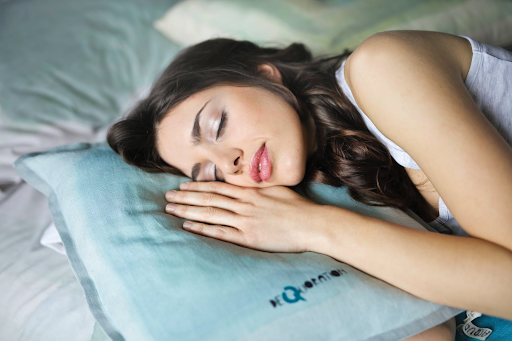Sleep is critical – a fact we all know. But with the pressure to fall asleep in time to get a solid 7–9 hours so high, it’s easy to forget the importance of how you fall asleep and how your body is positioned.
Some people sleep on their stomachs, others their backs or sides – and let’s not forget the origami sleepers whose limbs are tangled like acrobats! But all positions have a price. According to Sleeping Health Solutions, depending on how you lay your body down for dreamland can positively or negatively affect your health. So, to find out if you are doing more damage than good, let’s break down the most common sleeping positions.
Sleeping On Your Stomach
Stomach sleepers are few and far between, and while the position may be comfortable for some, it’s not recommended for many reasons. You hold most of your weight in the middle of your body, so sleeping on your stomach with your head raised on a pillow causes your spine to overarch and strain. Healthline explains that this can lead to nerve issues, pain, and numbness over time due to limited blood circulation.
If you are a stickler for stomach sleeping and cannot fathom hitting the hay any other way, then you should modify it. Keep your neck straight and only prop your forehead on the bottom edge of the pillow, so your spine is in a more neutral position, or alleviate the pressure on your lower back by resting your pelvis on a thin pillow.
The Fetal Position
When it’s cold, and you want a little extra body warmth curling up into the fetal position might seem like the best idea, but it's not. The extreme curvature of the spine can cause strain and discomfort in the neck and back, not to mention the havoc the position plays on breathing. Unlike our furry friends who find a nice spot in the corner and curl their cute little bodies up for sleepytime, all this position does for humans is limit space for the diaphragm and restrict breathing.
However, if you love to pretend you are still in the womb, Sleep.org recommends curling up in a relatively open position with a pillow between your knees to reduce joint pain and stiffness.
Sleeping On Your Back
Widely popular, comfortable, and natural, the supine position involves sleeping with your back flat on the bed. This helps prevent neck, shoulder, and back pain as your spine is in a more natural position, and having your head elevated on a pillow can help reduce problems associated with acid reflux.
While sleeping on your back is second nature to many, it’s not without some issues. For heavy snorers or those with obstructive sleep apnea, sleeping on your back will exacerbate these problems due to gravity pulling down your tongue and soft tissues in your throat, obstructing the airways. It can be hard to modify this position to allow more air, so if you struggle with heavy breathing or snoring, it’s best to re-train your sleeping habits and opt for a side body position instead.
Sleeping On Your Side
Ask the person next to you, ‘What position do you sleep in?’ and chances are they will answer that they sleep on their side. And the reason they will say they are a side sleeper because it’s the holy grail of body sleeping positions--most people sleep on their side.
Sleeping laterally is recommended by medical professionals and has many health benefits. With the right mattress and pillow, your spine won’t be twisted strangely or curved too tightly, and instead, it will remain elongated and relatively neutral, meaning less neck, back, and shoulder pain. So, if you are looking to improve your physical health, start by sleeping on your side and experience the wonders this body position has to offer.
Still Struggling to Get a Good Night’s Sleep?
If you’re still struggling to get a good night’s sleep after making changes to your sleeping position, take ApneaMed’s home sleep study to test for obstructive sleep apnea
. A board-certified sleep physician will review your results and provide a recommended treatment plan that will allow for a deeper sleep. ApneaMed can also supply the breathing machine you need. Contact our team to learn more.

